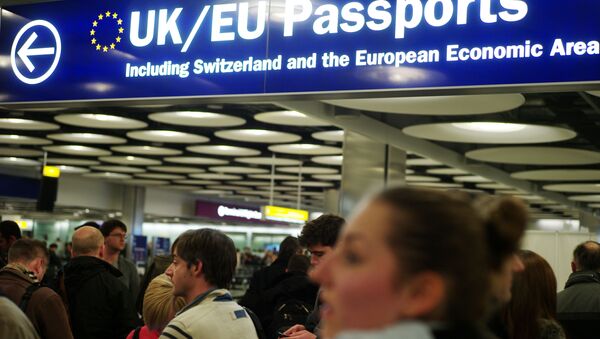If you are unable to speak English and have no skilled job, you will be subject to the new plans by the Vote Leave campaign that will mean migrants are barred from entering the UK unless they meet a certain criteria.
@vote_leave can we get rid of natives who don't meet your criteria?
— Vote REMAIN (@PeterHindley) May 31, 2016
Conservatives, Boris Johnson, and Michael Gove, and Laborite Gisela Stuart confirmed the new proposals in a statement on June 1, 2016. The Brexit team want to impose the Australian points based system for all migrants coming into the UK. This means that if voters opt to leave the EU in the referendum, migrants could find themselves excluded for having poor language skills or no skilled job.
.@BorisJohnson and @BeefyBotham: #VoteLeave and send back your postal vote TODAY!https://t.co/3u0d282CWH
— Vote Leave (@vote_leave) May 31, 2016
However, even fellow leave campaign groups do not share fully the views of Boris and Gove, Campaign for an Independent Britain, believe this is best for restricting immigration.
"We are in support of the Leave Alliance which proposes an exit plan called Flexcit, which we believe to be the only seamless exit route from the EU. This proposes that we re-join EFTA and access the Single Market via the EEA agreement, which requires us to adhere to the 'four freedoms' of the Single Market including free movement of people," Campaign director John Petley told Sputnik.
"However, EFTA members do have more leverage when it comes to restricting migration from the EU. Under Articles 112(1), 113 and Protocol 15 of the EEA agreement, non-EU members may apply for an emergency brake on migration without requiring the consent of the EU. Liechtenstein has availed itself of these exemptions for some time and no one is putting undue pressure on this country to end the "emergency'."
It's over to you to end this unhappy marriage. — https://t.co/5au74w8wx3 pic.twitter.com/xnZYeaATPI
— CIB (@FreeBritain) May 30, 2016
Mr Petley believes this is the best solution, while banning migrants due to lack of English language skills may not be necessary.
"This is as far as we could go initially — as far as restricting immigration from the EU is concerned, at least until the EEA agreement can be replaced with something better in the longer term. As to the migration from non-EU countries, we could already impose tougher controls if the government so desired and we don't have any problems with them so doing."
"However, in the modern age, there will always be people seeking to move from a failing country to a successful one. The 'migration crisis' in the Mediterranean is a particularly graphic illustration of this, but the large number of Greeks and Spaniards now working in the UK makes the same point."
Mr Petley and the Campaign for an Independent Britain team believe that Brexit will indeed make the UK more successful.
"We believe that the UK will be a more successful country after Brexit, so people will still want to come here. Some people, hoping for a drastic cut in the number of migrants the day we leave, are going to be disappointed. Outside the EU, however, we do have more leverage in reducing the 'pull' factor, including reducing tariffs with non-EU countries to enable them to send their goods to us more cheaply and thus generate more prosperity in their own countries," Mr Petley told Sputnik.
However, Mr Petley does believe that this latest Brexit proposal will not be made law and is somewhat impractical.
"I don't see anything as radical as this being implemented in the event of a Brexit. It sounds good in theory. [It's] impractical as far as migration from the EU is concerned, with non-EU migration, it does make sense, given the pressures our green spaces, schools, etc. are under. But I'd be surprised if it was adopted, even though it is not really that radical, being based on the policies of countries like Australia," Petley told Sputnik.
.@migrationwatch: Australian migration system "extremely complex", "thoroughly unsuitable" for UK https://t.co/hLPhDDDAcX
— InFacts (@InFactsOrg) June 1, 2016
When it comes to the issue of the UK potentially losing skilled workers, the Campaign for an Independent Britain, believe that there is no risk of executives and academics or doctors being excluded from the UK. But the excess of unskilled labor is an issue especially in the long term.
However, on the issue of whether this new proposal could alienate the UK from the rest of the world, Mr Petley does not believe, given the opinion polls and rise of anti-immigrant parties in other EU States, that migration will continue on the same scale for much longer.
"The sheer scale is becoming unacceptable. Therefore, it is unlikely that the UK will be alienated."


